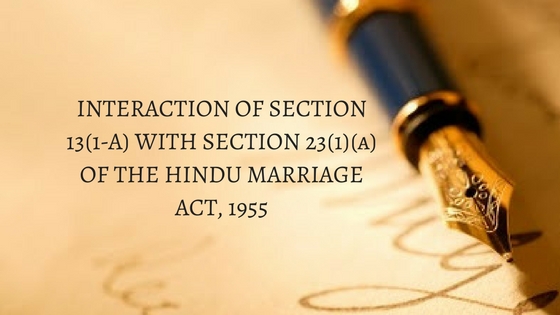Aapka Consultant Judgment Series- In this series, we are providing case analysis of Landmark Judgments of Hon’ble Supreme Court of India.
Hirachand Srinivas Mangaonkar Vs. Sunanda
AIR2001SC1285, (2001)4SCC125
Hon’ble Judges/Coram: D.P. Mohapatra, and Doraiswamy Raju, JJ.
Decided On: March 20th, 2001
FACTS:-
Appellant was the husband of the respondent. On January 6th, 1981, in a decree for judicial separation against the appellant, the High Court of Karnataka ordered that the appellant pay maintenance to the respondent and her daughter. The appellant did not comply with the Court order, and instead filed a petition for dissolution of marriage by a decree of divorce on September 13th, 1983 on the ground that no resumption of cohabitation took place between the parties for a period of more than one year since the decree of judicial separation had been passed. The High Court refused to grant the appellant’s prayer for divorce. The appellant appealed by way of special leave to the Supreme Court.
ISSUE:-
Whether in a petition for divorce filed under Section 13(1-A) it is open to the Court to refuse to pass a decree on any of the grounds specified in Section 23 of the Act?
JUDGMENT:-
The Court held that the contention of the appellant that the right conferred by Section 13(1-A) is absolute and unqualified and not subject to provisions of Section 23 is fallacious. The 1964 amendment to the Hindu Marriage Act was not introduced so that the provisions of Section 23 are abrogated. The object of Sub-Section (1-A) was to enlarge the right to apply for divorce and not to make it compulsive that a petition for divorce must be allowed on mere proof that there was no cohabitation or restitution for the requisite period. Therefore the contention that provisions of Section 23(1) are not relevant in deciding a petition filed under Sub-Section (1-A) cannot be accepted.
The Court then considered whether the appellant by refusing to pay maintenance has committed a ‘wrong’ within the meaning of Section 23 and whether in seeking the relief of divorce he is taking advantage of his own ‘wrong’. After the decree for judicial separation was passed it was the duty of both the spouses to do their part for cohabitation. In refusing to pay maintenance to the wife the appellant failed to act as the husband. Thereby he committed a ‘wrong’ within the meaning of Section 23 of the Act. Section 13(1-A) only enables either party to a marriage to file an application for the dissolution of marriage. The Section does not provide that once the applicant makes the application the Court has no alternative but to grant a decree of divorce. Such an interpretation runs counter to the provisions of Section 23(1)(a) or (b) of the Act.
If the provisions in Section 13(1-A) and Section 23(1)(a) are read together the position that emerges is that the petitioner does not have a vested right for getting the relief of a decree of divorce against the other party merely on showing that the ground in support of the relief sought as stated in the petition exists. Conduct alleged has to be more than a mere disinclination to agree to an offer of reunion, it must be misconduct serious enough to justify denial of the relief to which the husband or the wife is otherwise entitled. The decree for judicial separation affords an opportunity to the spouse for reconciliation and re-adjustment. Therefore the impression that Section 10(2) vests a right in the petitioner to get the decree of divorce notwithstanding the fact that he has not made any attempt for cohabitation with the respondent and has even acted in a manner to thwart any move for cohabitation does not flow from a reasonable interpretation of statutory provisions.
The appellant does not only commit a matrimonial wrong in refusing to maintain his wife but also tries to take advantage of his wrong for getting the relief of divorce. Even after the decree the appellant made no attempt to make any change in the situation and continued to live with his mistress. Living in adultery on part of the husband is a continuing matrimonial offence. The offence does not get wiped out or frozen merely on passing of a decree of judicial separation. Illegality and immorality cannot be countenanced as aids for a person to secure relief in matrimonial matters.
HELD:-
Appeal dismissed. The spouse seeking divorce cannot benefit from its own wrong in cases of dissolution of marriage. Provisions of Section 13(1-A) does not abrogate provisions Section 23.
To Get Legal Opinion from Advocates/ Legal Experts, Please click here
To Get Legal Opinion from Retired Hon’ble Judges, Please click here












